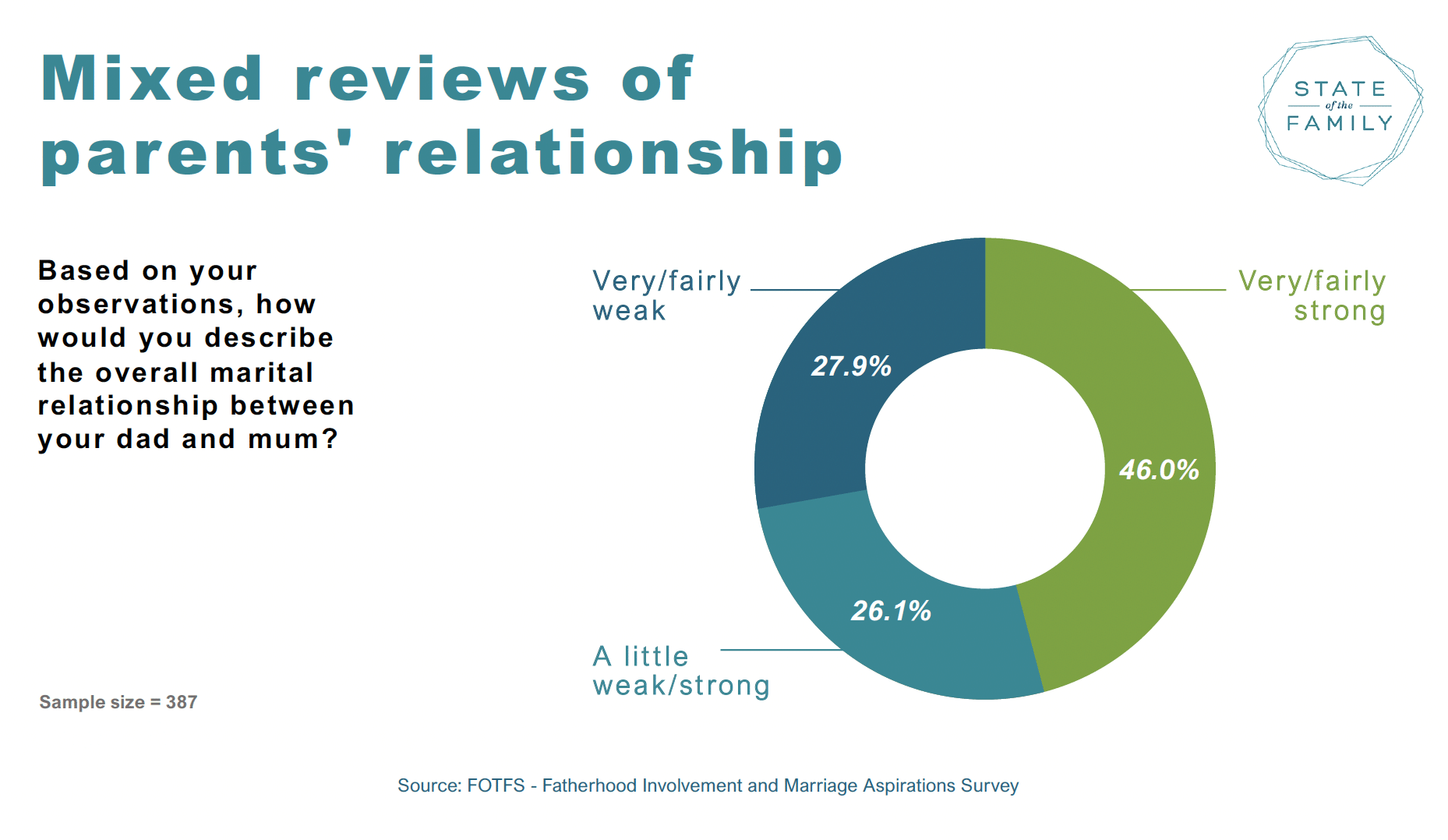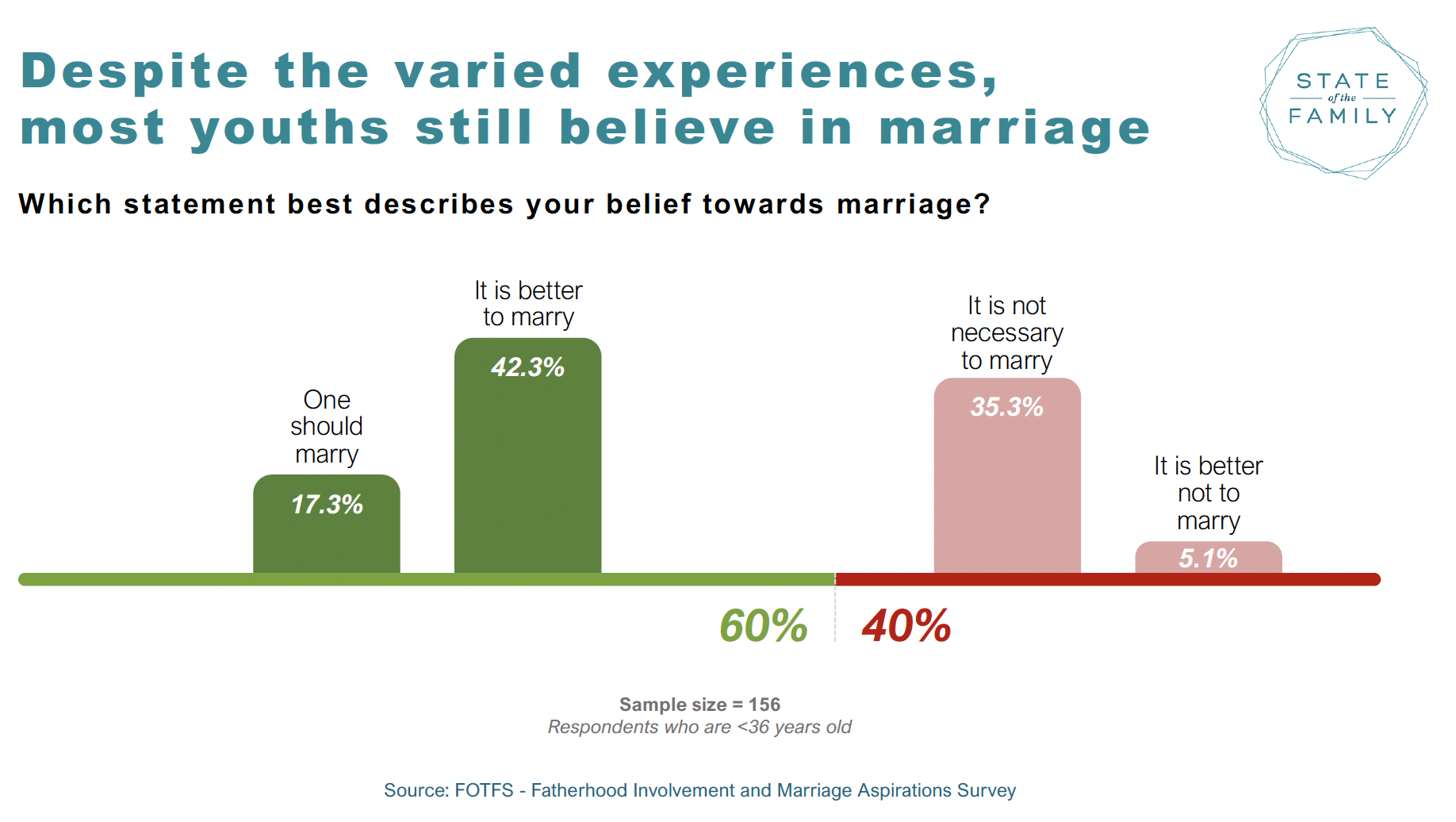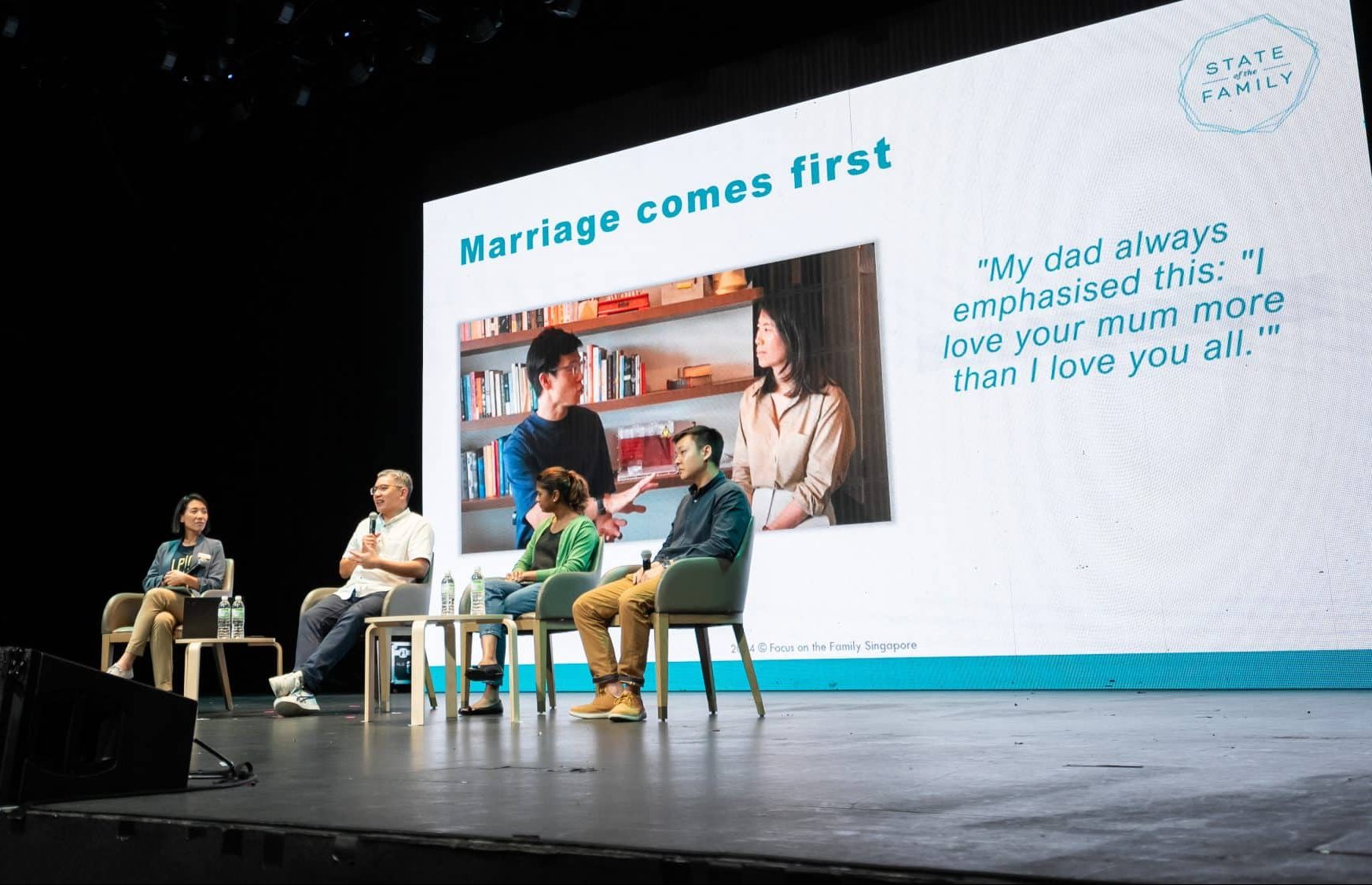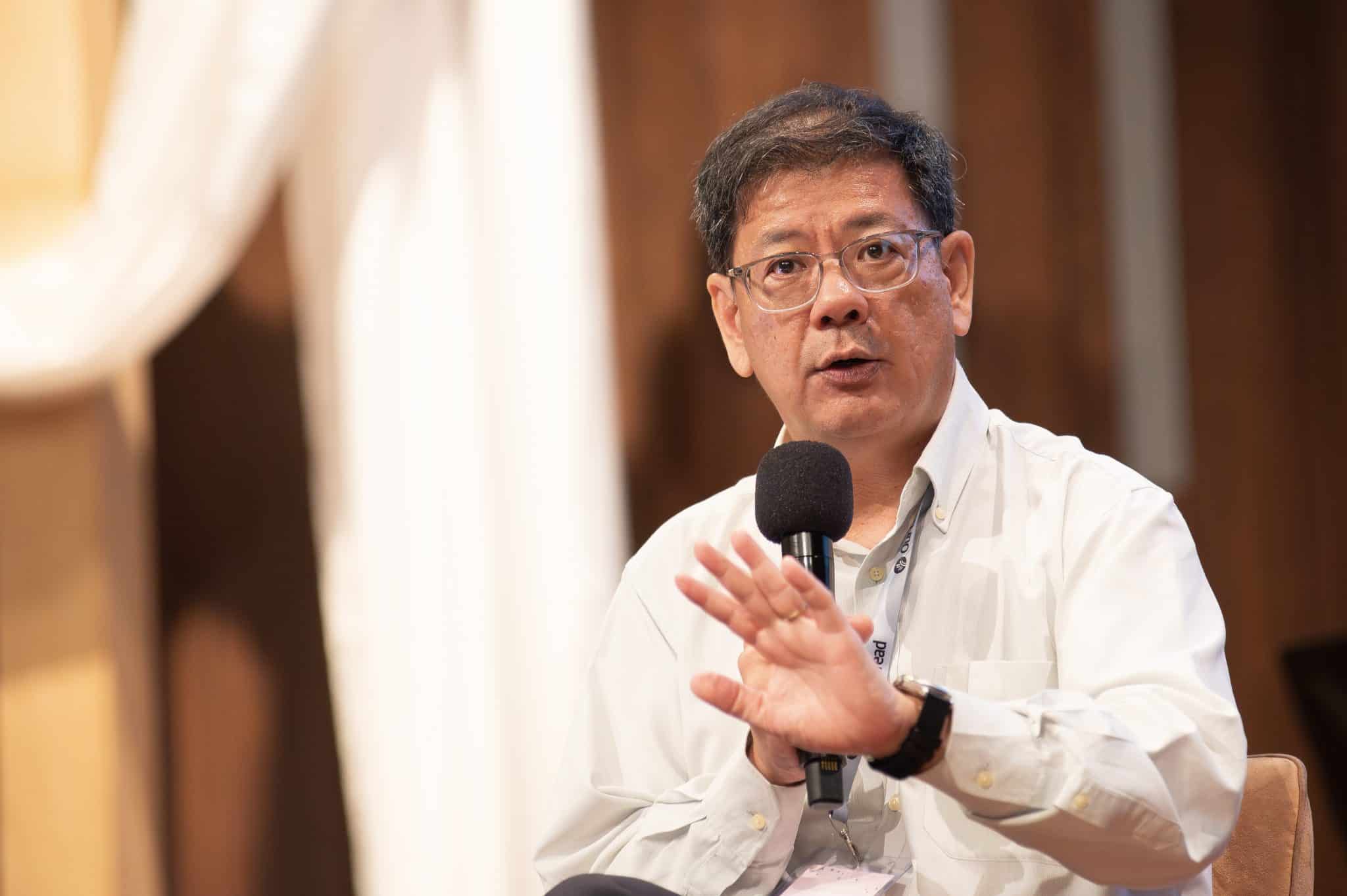Our kids are watching: State of the Family 2024 looks at the challenge of building strong marriages
by Gracia Chiang // February 29, 2024, 4:52 pm

At State of the Family 2024, Guest-of-Honour Minister for Social and Family Development, Masagos Zulkifli (far right), shared about the importance of going upstream to support marriages. All photos courtesy of Focus on the Family.
If children are looking to their parents’ relationship to inform their views on marriage, what takeaways are they going to come away with?
At last week’s State of the Family (SOTF) 2024, a key part of the conversation focused on what can be done to strengthen emerging families, which includes children, youths and young adults who are in the process of forming attitudes about dating and marriage.
Organised by Focus on the Family Singapore, the annual event was attended by some 400 participants across society, from faith-based organisations to community partners.
At SOTF 2024, results from Focus Singapore’s recent Fatherhood Involvement and Marriage Aspirations Survey were unveiled.
Conducted between November 2023 and February 2024, a total of 443 people were interviewed, around half of whom (51%) were aged 13–39 years old.
Part 1 of our SOTF 2024 coverage shared insights on fatherhood, while Part 2 will spotlight trends pertaining to marriage.
How do current marriages influence the desirability of marriage?
One of the aims of the local study was to look at how the state of current marriages shape the next generation’s views on marriage.

Source: Focus on the Family Singapore
Presenting the findings, Alicia Boo, Chief, Impact & Principal Counsellor, observed: “Close to half of respondents describe their parents’ relationship as very or fairly strong, while a third described it as very or fairly weak.”
Younger respondents were also asked about their views towards marriage.
While it is encouraging to see that the majority (60%) still believe in getting married, there remains a significant proportion (40%) who feel that it is not necessary to marry or better not to marry, noted Alicia.

Source: Focus on the Family Singapore
Comparing these results to national data, the latter turns up figures that are more optimistic, but it is clear there is still a downward trend.
According to the 2021 Marriage and Parenthood Survey, the majority (80%) of young, single respondents aged 21 to 35 said that they intend to marry.
But this was a decline compared to the proportion in 2016 (83%) and 2012 (86%) found the survey, which was commissioned by the National Population and Talent Division.

Young adult Luke Ong weighing in on why some of his peers don’t desire marriage.
Responding to the data by Focus Singapore, undergraduate Luke Ong agreed that from his own interactions with peers, “experiences sometimes shape reality”.
Based on conversations with other young adults, many reveal they do not aspire to get married because of “a bad experience they had from their own family”, such as having an absent father or endured through abusive behaviour, he said.
“So how do we… help people through that phase of dealing with all that past hurt and get them to the point of saying, ‘Yes this is something I’m willing to fight for, this is something I’m willing to look forward to,’?”
Keep investing in your marriage
Sharing that if there was one thing she would advocate for in Singapore’s push to become more family-friendly, another panellist Judith Xavier said it would be to “create strong marriages”.
“Encouraging people to get married – that part will come naturally in Luke’s generation if we support marriages that exist now,” added the working mother of two.
Children are indeed picking up on how their parents relate with one another, confirmed Judith.
“Even when we don’t think that they’re watching, they’re always looking and observing, and they pick up on every single thing.
“My boys can definitely tell from our tone of voice how we’re feeling and what is the temperature in the room.”
“Learn to put the marriage first.”
Judith observed: “I do realise that the stronger our marriage is, the better parents we are.
“I think we’re gentler to the children simply because we’re in a better state of mind.”
That is why making time to strengthen the marital bond is crucial for couples, she pointed out.
“What has been helpful for me and my husband is to learn to put the marriage first.”
Sharing that they schedule a date night at least once a month, Judith admitted that it can be very counter-intuitive, especially when they are faced with so many things to do on a daily basis.
“But when the marriage is strong, the small things don’t bother us as much. We also feel like we can go to each other with problems; we’re not fighting with each other.”

Speakers at SOTF reiterated the importance of making time to connect and communicate with one another in a marriage.
Two other speakers also shared their own experiences within their families, underscoring the value of building healthy marriages and the impact that these relationships have on children.
Father of three Nicholas Gabriel Lim said: “On days when there’s a lot of tension, it really affects my ability to parent.”
Agreeing that children are looking to their parents as examples, he emphasised talking through issues of conflict together as a couple, “so that it can come out right to the kids”.
“It’s always important for me to be in a good space with my wife, to be able to align if there was punishment involved or values to impart,” added Nicholas.
“We’re all not perfect,” he confessed.
“So I remind myself that we try our best. As long as we honour and spend time with each other to make sure we’re in sync in mind and heart.”
“I’m first and foremost a husband before I’m a father.”
Another younger father also reflected on how his own parent’s views on marriage influenced the way he sees family.
“My dad always emphasised, ‘I love your mum more than I love you all,'” recounted Josiah Ng through a video interview.
This has also become the guiding principle he holds to today. “I’m first and foremost a husband before I’m a father,” he declared.
Echoing the need for regular communication between husband and wife, Josiah explained that this is key because there will be times when each other’s bandwidth for parenting is reduced.
“People always say that a relationship is 50-50, right? Actually that’s a bit good to be true. Sometimes it’s 70-30, sometimes it’s 5-95,” he elaborated.
“So there’s this understanding that it’s a partnership – coming from a place of not who is better at what, but more of how can I help you.'”
Helping marriages thrive under pressure
With that said, what can be done as a community to ensure marriages are off to the best possible start?
Making reference to divorce statistics that were also highlighted at the event, Judith asked: “How do we support marriages especially those in the five-to-10-year category if we know they are more at risk?”
According to latest figures, the highest proportion of marital breakdowns happens between the fifth and 10th year of marriage. Those who were married for fewer than five years accounted for the second largest share.
Remarking that the numbers were sobering, Judith added: “Marriage is not a bed of roses… and to have put five to 10 years into it and to be thinking about divorce, I think that also says a lot about the state of our hearts and how tired husbands and wives must be.”
“If families are the foundation of society, then marriage is the cornerstone.”
Having more resources devoted to marriage preparation and mentoring were just a few suggestions raised at SOTF 2024.
For instance, Nicholas shared how he “benefitted from community leaders who pointed (him) to couples who had long marriages”.
Hearing their stories and the struggles of couples who had been married for 10 years or more opened his eyes, he said, adding that this was something that he did over a span of six months to a year.
If those thinking of marriage can be paired with mentors who can journey with them for a period of time, perhaps even up to two years, that would be beneficial, he surmised.
Affirming the value of mentoring, Judith concurred that this is one way for the community to come alongside to support married couples.
“If we say that families are the foundation of society, then marriage is the cornerstone,” she concluded.
RELATED STORIES:
“To have a happy marriage, learn how to manage conflict” : Psychologist-pastor Tan Siang Yang
We are an independent, non-profit organisation that relies on the generosity of our readers, such as yourself, to continue serving the kingdom. Every dollar donated goes directly back into our editorial coverage.
Would you consider partnering with us in our kingdom work by supporting us financially, either as a one-off donation, or a recurring pledge?
Support Salt&Light



